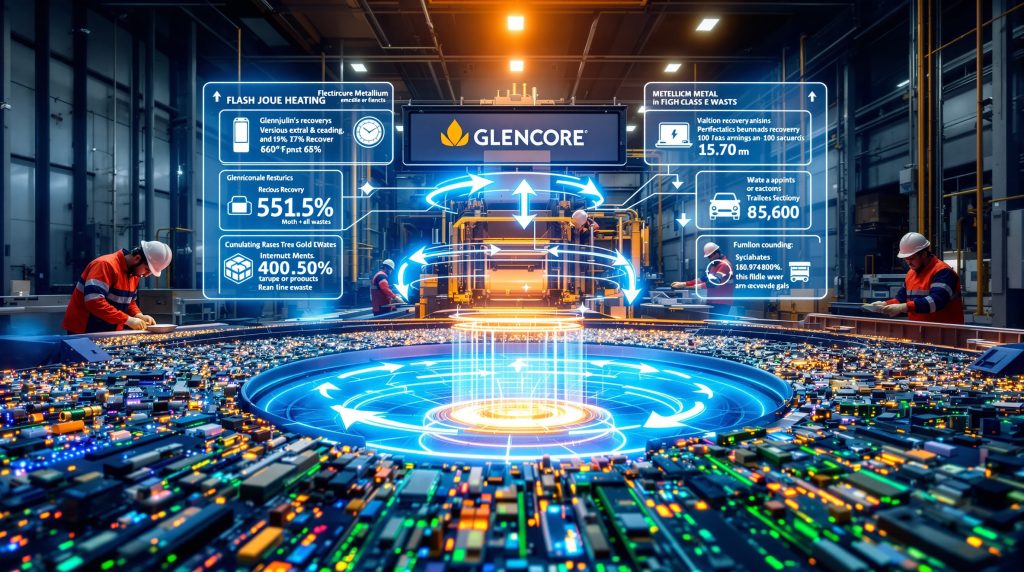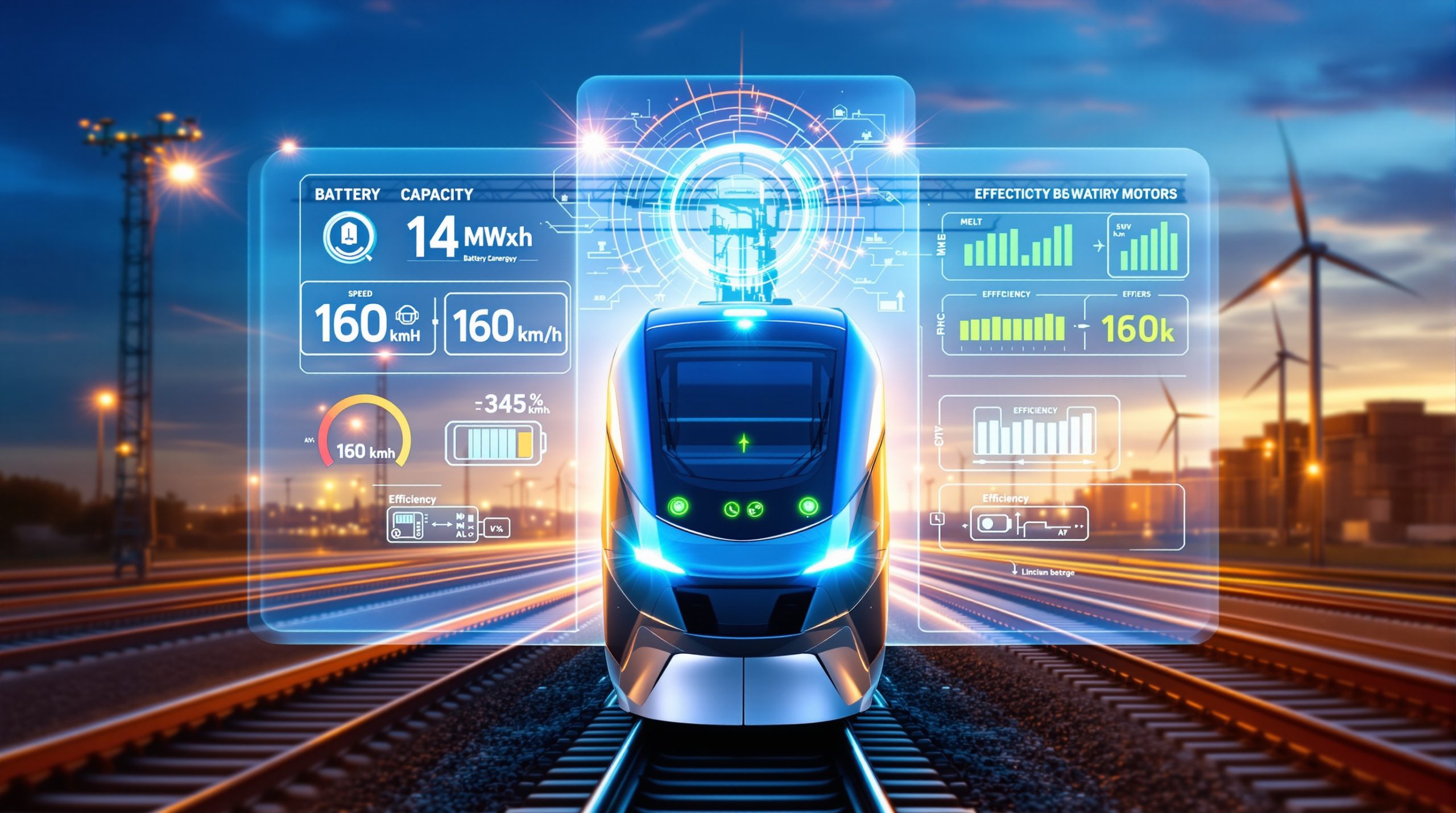Revolutionizing Critical Metal Supply Chains Through the Metallium-Glencore E-Waste Partnership
The strategic collaboration between Metallium and Glencore represents a transformative development in the e-waste recycling industry, establishing a framework for sustainable metal recovery and circular economy practices. This partnership addresses mounting concerns about critical metal supply security while introducing innovative solutions for electronic waste management that could reshape the recycling landscape.
What Makes the Metallium-Glencore Partnership Significant?
Strategic Alignment of Complementary Capabilities
The partnership brings together two organizations with highly complementary strengths. Metallium contributes its proprietary Flash Joule Heating technology, specifically engineered for efficient metal recovery from electronic waste. This innovative approach allows for the extraction of valuable materials that might otherwise be lost through conventional recycling methods.
Meanwhile, Glencore brings its extensive global recycling network and established expertise as one of the world's largest recyclers of end-of-life electronics. With a market capitalization of $698.5 million, Metallium gains immediate credibility and operational support through this alliance with an industry giant.
Together, they're creating a closed-loop system where feedstock supply and metal offtake arrangements support circular economy principles in ways that neither company could achieve independently.
Securing Critical Feedstock Supply
A cornerstone of the partnership is the secure supply of electronic waste for Metallium's operations. The Memorandum of Understanding (MOU) ensures reliable electronic scrap supply for Metallium's Texas facility, supporting the company's Stage One processing target of 8,000 tonnes per year of printed circuit board material.
This arrangement provides Metallium with consistent, high-quality feedstock—crucial for maintaining efficient operations and product quality. The framework also includes provisions for volume expansion as Metallium scales its operations beyond initial capacity.
Additionally, Glencore will provide valuable technical services including assaying for incoming feedstock materials, enhancing quality control throughout the recycling process.
Comprehensive Offtake Arrangements
On the output side, Glencore commits to purchasing up to 75% of Metallium's marketable recycled products. This offtake agreement covers various product forms including metallic metals, metal chlorides, and metal hydroxides—providing Metallium with revenue certainty and established sales channels.
Notably, the agreement strategically excludes specialty products including gallium, germanium, indium, and rare earth elements. This exclusion allows Metallium to independently market these high-value materials, potentially capturing premium pricing for these increasingly critical technology metals.
The MOU grants Glencore exclusivity for the negotiated offtake volumes through December 31, 2025, creating stability while allowing flexibility for future growth.
How Does Metallium's Technology Transform E-Waste Processing?
Flash Joule Heating Innovation
At the heart of Metallium's value proposition is its Flash Joule Heating technology—a proprietary process that enables efficient recovery of valuable metals from electronic waste. The technology applies rapid, intense heat to e-waste materials, breaking down complex components and liberating valuable metals in ways conventional recycling cannot achieve.
This approach is particularly effective for extracting both common metals like copper and gold, as well as specialty metals that are typically present in very small concentrations but carry significant value. These include elements crucial for modern technologies such as gallium (used in LEDs and solar cells), germanium (infrared optics and fiber optics), and rare earth elements (essential for magnets in electric vehicles).
The validation of this technology through partnership with an established industry leader like Glencore signals confidence in Metallium's approach to solving complex e-waste challenges.
Hub-and-Spoke Operational Model
Beyond the technology itself, Metallium is implementing a strategic hub-and-spoke operational model. The company is developing a national network of e-waste processing facilities across the United States, with strategic facility placement near collection hubs, data centers, and industrial corridors.
This model is designed to optimize logistics, reduce transportation costs, and maximize processing efficiency. By positioning facilities close to e-waste generation sources, the company can minimize the environmental impact and cost of transporting materials while maximizing processing throughput.
The scalable approach allows for capacity expansion as market demand grows, providing flexibility to respond to increasing e-waste volumes and evolving regulatory requirements.
What Are the Economic and Environmental Benefits?
Supply Chain Security Advantages
One of the most significant benefits of the Metallium-Glencore partnership is enhanced supply chain security for critical metals. The collaboration reduces dependence on primary mining for critical and precious metals by creating alternative recovery pathways.
This approach is particularly valuable given increasing geopolitical tensions surrounding key mineral resources. Many critical metals face concentration risk, with production dominated by a small number of countries. For instance, China controls approximately 80% of rare earth element processing globally, creating significant supply vulnerabilities for Western economies.
By developing domestic processing capabilities, the partnership strengthens U.S. supply chain resilience and creates alternative supply channels for metals facing potential shortages or geopolitical constraints.
Environmental Impact Reduction
From an environmental perspective, the benefits are substantial. The partnership diverts electronic waste from landfills and improper disposal, addressing a growing waste management challenge. Global e-waste generation is increasing at approximately 3-4% annually, making innovative solutions increasingly urgent.
The recycling process itself delivers environmental advantages, requiring significantly less energy than primary extraction—often 60-95% less energy depending on the metal being recovered. This translates to a substantially reduced carbon footprint compared to conventional mining operations.
Additionally, the approach minimizes environmental damage associated with traditional mining, including habitat destruction, water pollution, and soil contamination. The concentrated nature of metals in e-waste (often many times higher than in natural ores) further enhances the efficiency and environmental benefits of urban mining.
Market Positioning Benefits
From a business perspective, the partnership validates Metallium's technology and business model through association with an established industry leader. This enhances the company's credibility with potential investors and stakeholders, potentially facilitating easier access to capital for future growth.
The collaboration provides a foundation for future expansion opportunities and creates competitive advantages in the rapidly growing e-waste recycling sector. As ESG considerations increasingly influence investment decisions, companies demonstrating leadership in sustainability transformation may benefit from valuation premiums.
What Does This Mean for Metallium's Growth Strategy?
U.S. Expansion Blueprint
The Metallium-Glencore partnership supports an ambitious expansion strategy. The Texas facility serves as Metallium's initial commercial operation with 8,000 tonnes annual capacity, but represents just the beginning of a larger vision.
As CEO Michael Walshe explained, the collaboration "provides feedstock security and offtake certainty" and "supports our planned expansion" beyond the initial facility. This support is critical as the company develops additional processing sites across the United States.
Strategic site selection for future facilities will focus on proximity to e-waste generation sources, including major urban centers, technology hubs, and data center clusters. This approach minimizes transportation costs while maximizing access to high-quality feedstock.
Financial Implications
The partnership delivers significant financial benefits for Metallium. Secured feedstock supply reduces operational risks by ensuring consistent material flow, while offtake agreements provide revenue certainty—two factors that typically challenge recycling startups.
These arrangements enhance investor confidence in Metallium's business model and create a stable foundation for sustainable financial performance. With MTM shares trading at $1.14, the company has established a solid market position that could strengthen further as commercial operations expand.
By securing both inputs and outputs, Metallium can focus resources on optimizing its core processing technology and expanding capacity rather than struggling with supply chain uncertainties.
Technological Leadership
Through this collaboration, Metallium cements its position as a technology leader in critical metal recovery. The partnership validates the company's innovative approach to e-waste processing and establishes a framework for continued innovation and process improvement.
More importantly, it demonstrates the commercial viability of Flash Joule Heating technology at scale. This validation is crucial for attracting additional partners, customers, and investors as the company expands its operations nationally.
As the technology matures, Metallium may find opportunities to license its approach to other operators or expand into additional waste streams beyond electronics, further enhancing growth potential.
What's Next for the Metallium-Glencore Collaboration?
Path to Binding Agreement
While the current MOU establishes a framework for long-term partnership, both companies are working toward finalizing a binding agreement by December 31, 2025. This transition from memorandum to binding contract will solidify the relationship and potentially expand its scope.
Negotiations will likely include provisions for relationship evolution as operations scale, with potential adjustments to volume commitments, product specifications, and technical support arrangements. The current framework provides flexibility while establishing clear parameters for the future binding agreement.
Global Partnership Potential
Beyond the initial U.S. focus, discussions are underway for broader international collaboration. The companies have indicated potential interest in leveraging Glencore's global recycling footprint to expand the partnership's reach beyond North America.
This global potential could include replicating the successful model in additional markets, particularly in Europe and Asia where e-waste volumes continue to grow rapidly. International expansion would allow both companies to capture economies of scale while addressing e-waste challenges in multiple regions.
Industry Impact Expectations
The partnership is likely to influence e-waste management practices industry-wide. By demonstrating the commercial viability of advanced recycling technologies, Metallium and Glencore are establishing a model that other companies may seek to emulate.
The collaboration showcases the benefits of strategic partnerships between technology innovators and established industry players, potentially accelerating similar arrangements throughout the recycling sector. As sustainability pressures intensify, these types of vertical integration models may become increasingly common.
How Does This Partnership Address Critical Metal Supply Challenges?
Reducing Primary Mining Dependence
A fundamental benefit of the Metallium-Glencore partnership is creating alternative supply channels for metals traditionally sourced through mining. By establishing domestic processing capability for critical materials, the collaboration reduces reliance on extractive industries with their associated environmental and social impacts.
This approach is particularly valuable for metals facing supply constraints due to geological scarcity, geopolitical factors, or production concentration. As technology manufacturing increasingly demands specialty metals in small but crucial quantities, diversifying supply sources becomes strategically important.
The partnership supports the transition to more sustainable metal supply chains by demonstrating that "urban mining" of e-waste can serve as a viable complement to traditional extraction.
Specialty Metal Recovery Focus
The partnership's approach to specialty metals deserves particular attention. Metallium retains marketing rights for strategic metals like gallium, germanium, and rare earths—elements that are present in very small quantities in electronics but carry disproportionate value and supply risk.
These metals face potential supply constraints due to their limited production, often as byproducts of other mining operations. For example, gallium is primarily recovered as a byproduct of aluminum production, while germanium is typically a byproduct of zinc refining.
The Metallium recovery process is specifically designed to extract these high-value, low-concentration metals that are difficult to source through conventional methods. This capability addresses a critical gap in recycling technology that has historically focused on bulk metals like copper and gold.
Circular Economy Implementation
Perhaps most significantly, the partnership embodies practical application of circular economy principles. By creating a closed-loop system for electronic materials, Metallium and Glencore are transforming waste streams into valuable resource inputs.
This approach demonstrates the commercial viability of circular business models, showing that natural capital initiatives can deliver both environmental benefits and economic returns. The system they're creating provides a template for similar closed-loop arrangements in other industries and material streams.
What Market Factors Are Driving This Partnership?
Growing E-Waste Volumes
Global electronic waste generation continues to accelerate, creating both environmental challenges and resource recovery opportunities. The United States produces approximately 6.9 million tonnes of e-waste annually, making it one of the largest generators worldwide.
Despite this volume, less than 25% of U.S. e-waste is currently recycled effectively. The majority ends up in landfills, informal processing operations, or exported to countries with less stringent environmental regulations—representing a significant untapped resource potential.
The Metallium-Glencore partnership addresses this opportunity by establishing efficient domestic processing capability for materials that would otherwise be lost or improperly handled.
Critical Metal Supply Concerns
Market dynamics for specialty metals are increasingly characterized by supply constraints and volatility. Technology manufacturing requires an ever-expanding range of elements, many of which face production limitations or geopolitical risks.
Growing recognition of supply vulnerabilities for strategic materials has prompted both industry and government initiatives to secure more reliable access. These concerns have intensified as tensions between major economies affect traditional supply chains.
Additionally, market premiums for responsibly sourced materials are increasing as manufacturers seek to demonstrate environmental stewardship and supply chain transparency. Recycled metals often command premium pricing due to their reduced environmental footprint.
Regulatory Landscape Evolution
The regulatory environment surrounding e-waste continues to evolve, with strengthening management regulations globally. Extended producer responsibility programs are expanding in many jurisdictions, placing greater onus on manufacturers to ensure proper end-of-life management of their products.
Policy frameworks increasingly emphasize circular economy principles, creating incentives for companies that implement closed-loop systems. These regulatory trends favor partnerships like the Metallium-Glencore collaboration that demonstrate practical circular economy implementation.
Simultaneously, increasing restrictions on improper e-waste disposal create market opportunities for companies offering compliant, environmentally sound alternatives.
FAQ: Understanding the Metallium-Glencore Partnership
How does this partnership benefit Metallium specifically?
The collaboration provides Metallium with secured feedstock supply for its Texas facility, technical support for quality assurance, established offtake channels for recycled products, and validation of its proprietary technology by a global industry leader. These benefits significantly reduce operational risks while enhancing market credibility.
Beyond these immediate advantages, the partnership creates a platform for Metallium to scale operations more rapidly than would be possible independently. By addressing both input and output challenges simultaneously, Metallium can focus resources on optimizing its core processing technology.
What makes Glencore a valuable partner in e-waste recycling?
Glencore brings extensive experience as one of the world's largest recyclers of end-of-life electronics and batteries. The company has recycled over one million metric tons of electronic scrap since the 1990s and maintains an established global network of recycling operations, particularly in North America.
This operational history provides Glencore with deep insight into e-waste composition, quality assessment, and market dynamics for recycled materials. Their established relationships with both e-waste generators and metal consumers create natural synergies with Metallium's processing capabilities.
How does this partnership contribute to sustainability goals?
By recovering metals from e-waste rather than primary mining, the partnership reduces energy consumption, carbon emissions, and environmental disruption associated with traditional extraction methods. The collaboration also diverts electronic waste from landfills and improper disposal channels, supporting circular economy principles.
Additionally, the partnership creates domestic processing capability for critical materials, reducing transportation emissions associated with international material movements. This localized approach aligns with broader sustainability initiatives focused on shortening supply chains and reducing unnecessary material movement.
What types of metals will be recovered through this partnership?
The collaboration will focus on recovering a wide range of metals from electronic waste, including precious metals (gold, silver, platinum), base metals (copper, aluminum), and specialty metals (gallium, germanium, indium, rare earth elements). These recovered materials will serve as inputs for manufacturing new electronic products.
The recovery approach is particularly effective for capturing metals that are present in very small quantities but carry significant value. For instance, a tonne of mobile phones contains approximately 100 times more gold than a tonne of gold ore, illustrating the concentration advantage of e-waste recycling.
How does this partnership affect Metallium's market position?
The collaboration with a global industry leader like Glencore enhances Metallium's credibility, validates its technology and business model, and provides a foundation for sustainable growth. The partnership positions Metallium as an emerging leader in advanced e-waste recycling technology with strong commercial potential.
For investors, the partnership reduces key operational risks by securing both feedstock supply and product offtake—two factors that typically challenge recycling startups. This risk reduction could translate to more favorable financing terms for future expansion and potentially stronger valuation multiples.
Key Components of the Metallium-Glencore Partnership
| Partnership Element | Details | Strategic Significance |
|---|---|---|
| Feedstock Supply | Glencore to provide electronic scrap to Metallium's Texas facility | Secures reliable input materials for initial 8,000 tonnes annual capacity |
| Technical Services | Glencore to provide assaying and quality assessment for incoming materials | Ensures consistent feedstock quality and processing efficiency |
| Offtake Agreement | Glencore to purchase up to 75% of recycled metal products | Provides revenue certainty and established market channels |
| Product Exclusions | Specialty metals (gallium, germanium, indium, rare earths) excluded from offtake | Allows Metallium to independently market high-value materials |
| Agreement Timeline | MOU effective until December 31, 2025 unless extended or replaced | Creates framework for developing long-term binding agreement |
| Exclusivity Terms | Glencore granted exclusivity for negotiated offtake volumes | Establishes clear parameters for market relationships |
| Global Potential | Framework for exploring broader international collaboration | Positions partnership for potential expansion beyond U.S. market |
Benefits of E-Waste Recycling vs. Primary Mining
| Aspect | E-Waste Recycling | Primary Mining | Advantage |
|---|---|---|---|
| Energy Consumption | 60-95% less energy required | High energy intensity | E-Waste Recycling |
| Carbon Emissions | Significantly reduced carbon footprint | Major carbon emissions source | E-Waste Recycling |
| Water Usage | Minimal water requirements | Extensive water consumption | E-Waste Recycling |
| Land Disruption | No habitat destruction | Significant ecosystem impacts | E-Waste Recycling |
| Metal Concentration | Up to 40-50x higher than ore for some metals | Declining ore grades worldwide | E-Waste Recycling |
| Supply Security | Domestic processing potential | Often geopolitically constrained | E-Waste Recycling |
| Social Impact | Creates green economy jobs | Often controversial community impacts | E-Waste Recycling |
The Future of E-Waste Recycling
The Metallium-Glencore partnership represents just the beginning of what could become a transformative approach to critical metal supply chains. As technology continues to evolve and material demands shift, the ability to efficiently recover valuable resources from waste streams will become increasingly important.
Looking forward, similar partnerships may emerge across various waste streams and material types. The model established by Metallium and Glencore provides a blueprint for collaboration between technology innovators and established industry players—demonstrating how complementary capabilities can create systems greater than the sum of their parts.
For consumers, investors, and policymakers alike, this partnership illustrates the potential for circular economy principles to address both environmental challenges and resource security concerns. The transition from linear "take-make-dispose" models to circular systems represents not just an environmental imperative but an economic opportunity.
As this shift accelerates, companies positioning themselves at the forefront of advanced recycling technology—like Metallium with its Flash Joule Heating approach—may find themselves uniquely positioned to capitalize on growing market demand for sustainable material solutions.
Disclaimer: This article contains information about market developments and business strategies that should not be construed as investment advice. All market forecasts and business projections involve inherent risks and uncertainties. Readers should conduct their own research and consult financial advisors before making investment decisions based on information presented herein.
Looking for the Next Major Mineral Discovery?
Discover significant ASX mineral discoveries the moment they happen with Discovery Alert's proprietary Discovery IQ model, which transforms complex mineral data into actionable insights for both short-term traders and long-term investors. Visit our discoveries page to understand how major mineral discoveries have historically generated substantial returns and begin your 30-day free trial today.




